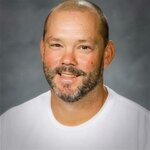

Twenty minutes into a Cascade High School (CHS) track practice, the athletes have dispersed to their specialties, leaving the largest pack—sprinters, jumpers, and hurdlers—with Coach Carl Haberberger, who wears other hats as head football coach and as teacher of Consumer and Family Science courses. The athletes are doing drills through an array of hurdles with precision and focus.
Haberberger is watching so they don’t goof off. He calls out reminders now and then, not peppering them with too much information. As they hop one leg at a time over the hurdles, he says, “Work on that dorsiflexion,” referring to flexing of the foot in an upward direction. Dorsiflexion, he explains, puts the foot in the proper position under the hip so the leg can act like a “loaded spring and pop off the track.”
After several rounds of drills, the teens head off to practice their events, and Haberberger stays with those that want to improve their use of the starting blocks for the 200 or 400. Being on the track and one-on-one coaching is the perfect counterpoint to hours spent in the classroom and an antidote to the occasional rough day. Before suggesting a change to the foot action off the block or to the straightness of the athlete’s back as they start to run, Haberberger asks, “How did it feel?” so the athlete has time to reflect and grow their kinesthetic awareness as they move.
Haberberger alternates these technique-heavy but aerobically light practices with hard workouts like one the day before. He says the drills are important as they work on hip strength and flexibility, which can prevent a lot of injury.
He’s excited to see that he’s convinced some football players to come out for track, especially as sprinters and throwers. He doesn’t favor one sport over another and loves variety, having himself competed in multiple sports—football and track mostly, but also Nordic skiing—in his youth and coaching all three today.
“I love coaching the different sports and I believe, philosophically speaking, being a multiple sport athlete is the better route,” said Haberberger. “You don’t need to have the same reason or passion for participating in each sport. One sport may promote better mental health while another might have physiological benefits. For example, I get to share the camaraderie and family aspect of football, see the universal value of hard work in track, and feel an appreciation for the outdoors with cross country skiing.”
This is Haberberger’s second year at CHS, and prior to that he taught and coached for nearly two decades in the Wenatchee School District, teaching sixth grade and then eighth grade language arts. He credits that time to honing his teacher toolkit, saying, “Middle school teachers work really hard to make learning relevant, and middle schoolers still don’t care. If you can get a middle schooler to learn something, you can get anybody to learn something, no matter the subject.”
He's not afraid of change and happy to be in the Cascade School District (CSD) where his wife, Sia, works as a seventh grade math teacher and his children go to school. “When it came to applying at Cascade, I knew teaching something totally new at the high school level was risky, but it was also an opportunity I couldn’t pass up, and I am so glad I went for it,” he said.
“Culinary is a great class. Some kids can’t even boil water so there’s a lot to learn there. I like the kids that sign up for the Early Childhood Development class and with my experience over the years as a teacher, coach, and father there is plenty of opportunity to get into Q&A storytelling mode.
“Living Skills is the third course I teach and is most like the ‘Home Ec’ we took as kids. The biggest difference is the focus on 21st century skills. We still learn how to sew a button, but we don’t spend weeks on stitching because the workforce is changing. You don’t just do your job by yourself anymore; the focus is on working with others. Soft skills such as communication, empathy, and organization are what employers value these days, so I try to put students in situations where they have to practice working together.”
Haberberger has plugged into several channels at CSD and in the Upper Valley community in part because he grew up here and knows it so well. “It’s hard to imagine someplace better than growing up in Leavenworth. My friends and I owned the ski hill (and Steven’s for that matter), we pioneered the skidder trails down Derby, and surfed the rapids at Barn Beach. During summer, if I wasn’t in the river, I was on some wild hike with my dad.”
Now that he’s taken the reins as head football coach, Haberberger would love to see football, including the pipeline from the youth and middle school programs, grow. What makes some kids nervous is the physicality of tackling and so he puts a lot of emphasis on tackling so athletes can do it confidently and safely. If more soccer players came out for football instead of doing year-round soccer, he envisions their nonverbal communication on the field could translate to great zone defense. He welcomes older athletes new to football because each position requires different skills, and each body type has a role.
CHS is fortunate to have teachers like Haberberger who have the passion, skill and dedication to impact students in multiple arenas. “In season, I’ll work 60-to-70-hour weeks,” he admits. “But to be honest, that’s what I’m used to. I’ve either been an athlete or a coach since seventh grade. It’s crazy to think about, but I’ve been practicing football or track after school for the past 32 years. The nice thing is each sport season is a bit different.”
Haberberger went on, saying, “Coaching was the reason I wanted to be a teacher. Many of my favorite teachers were coaches. The relationships developed were just at a deeper level; there was more trust there. I’m not sure about the actual statistics, but the Cascade teachers/coaches of the late 90’s unknowingly influenced a whole lot of us to become educators. They were having fun and that was appealing.
“I love to see kids involved in school activities. So many of them choose to work now, and school culture has taken a hit. My goal as a teacher and coach at Cascade is to get back to that sense of community.”
Comments
No comments on this item Please log in to comment by clicking here